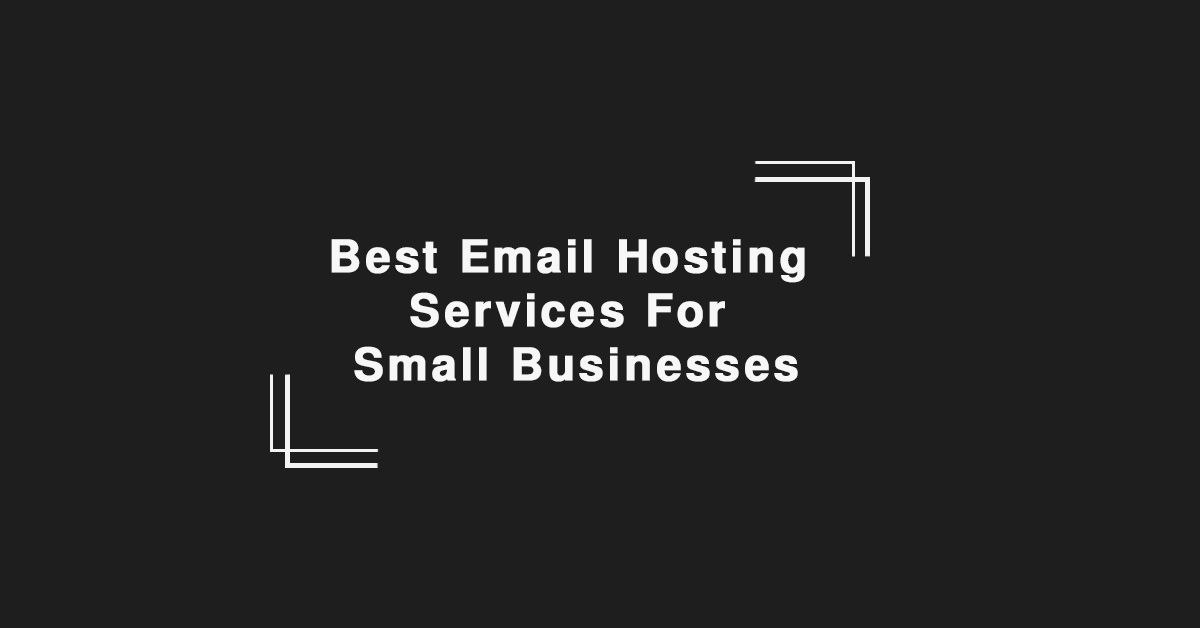The 7 Best Free & Paid Email Hosting Services For Small Business In 2021
Email hosting is a program that manages email servers that provides people and organizations with an email service. It enables users to use their custom domain based email accounts to send and receive emails. The email hosting service provides the stored data with safe access, and also provides anti-spam and anti-virus filters.
According to stats, as their key platform for attracting customers, 81 percent of small and medium-sized companies also rely on emails. The results show that sending emails appears to be the best way to achieve direct reach and influence.
Following are the 7 best and affordable email hosting for small businesses which are secure and affordable than any other email hosting. Furthermore, it is important for small businesses to save cost yet work with reliable email hosting services:
Zoho Mail
Each small business needs email and some kind of productivity suite for the business, and several solutions are available. With Zoho email hosting, you can achieve agile and enhanced protection against spam. It provides professional email ids to give your brand higher visibility and authenticity.
You can operate all settings, customizations, and modifications using Zoho’s effective and simple control panel. You can connect members easily, set up your rules, manage group names, and more. In order to fight any legal threats, keep the emails for a certain duration. To help you easily find your retained addresses.
MxRoute
Mxroute offers a fully functioning control panel where you can connect domains and email addresses and 300 outgoing emails per hour, with no restrictions except the storage you need (per e-mail address). This is an appealing characteristic. To build email accounts for different websites, you can use only one address. The number of email addresses is paid by most other email hosting companies.
DKIM passwords, configure forwarders, configure the inbound spam filters, and so much more can also be handled!
Rackspace
Created in 1998, Rackspace is an operated and managed hosting business. You can trust their website and email hosting skills.
If a secure email hosting account with the domain name of your business is all you need, then Rackspace Email could be perfect. It has a 100% guarantee of uptime. Their email scanning will keep spam and viruses away from your inbox. Never read, sell or search your email addresses, Rackspace promises
To move your existing email accounts and communications to Rackspace Email, Rackspace offers an easy-to-use email transfer platform. Rackspace support via talk, tickets or phone is available 24/7.
Office 365
If your company depends on Microsoft Office Suite (Outlook, Word, Excel, PowerPoint) to function, Office 365 Enterprise Premium is a no-brainer for your custom domain name email hosting account.
Office 365 Enterprise Premium contains 50GB space for email hosting and uses custom domain names for email addresses.If you work on the cloud and do not need a Microsoft Office suite laptop edition, then you can save a lot by subscribing to the Office 365 Business Essentials package. You can send files up to 150 MB using this email hosting.
It also provides 100 GB storage to let you store your emails with custom images and formats. With a straightforward admin center, you can manage your emails better, including creating new accounts, deletion, custom script creation, and so on. Microsoft 365 gives you the best anti-spam filtering and anti-malware protection to safeguard your emails against potential cybercrimes. Besides, you also get archive features and eDiscovery.
Google Gsuite
G Suite (called Google Apps) is a series of working applications based on the Google cloud, including Gmail, Calendar, Hangout, Drive, Docs, Sheets, Slides, Pages, and more.
With over a billion active users worldwide, Gmail is undoubtedly the most popular email service nowadays. Many third-party software add-ons are provided by Gmail to power up your inbox and boost your productivity. G Suite includes your custom domain name (@yourcomapny.com) and email addresses. For a Gmail account, you can add up to 30 email aliases. Google offers G Suite customers with 24/7 mobile and email support. For importing your email messages, contacts, calendars into G Suite, refer to the migration guide.
Namecheap
A common domain name registrar is Namecheap. Other internet services are also provided, such as web hosting, SSL, VPN, etc. Private Email Hosting from Namecheap is the company’s personalized domain name webmail service.
Namecheap is a domain registrar, so in order to use its email hosting facility, you do not need to migrate your domain name to Namecheap.In order to experience the efficacy of this platform, you can also get a free trial of Namecheap for two months and then select a contract to continue using its advantages for your whole company.
It’s easily compatible with smartphones such as Linux, Windows, or iOS. It includes domain-based addresses, centralized mailbox, spam security, HTML signatures, POP3 or IMAP access, and i-connected protected email access.
ProtonMail
ProtonMail is an open-source email service which sends and receives email messages that are encrypted.
It was created in 2013 by a group of scientists who met at CERN, the European Nuclear Research Organisation, and expressed a vision of a more safe and private Internet. ProtonMail solely develops and maintains all server infrastructures in Switzerland. The service and your private data are also protected by Swiss privacy regulations, some of the toughest in the world.
You should send an auto-destruct email address with an expiration period in addition to the ProtonMail encrypted contact. Your message cannot be read by the energy type until it expires.Email receiver cannot read your message after it has expired. This is convenient to send one time a secret message.
However, owing to the safety and protection of the site, after resetting the account password, you can not access your own old posts. ProtonMail is the world’s largest secure email service. It is a crowd supported open source project. It does not display advertising or watch your details.
Email server self-hosting is a program that you administer on your own and operates with other email providers. This prohibits third parties from accessing the messages without authorization, which also saves email subscriptions per account. It’s not easy to self-host your email, though (more difficult than web hosting).

